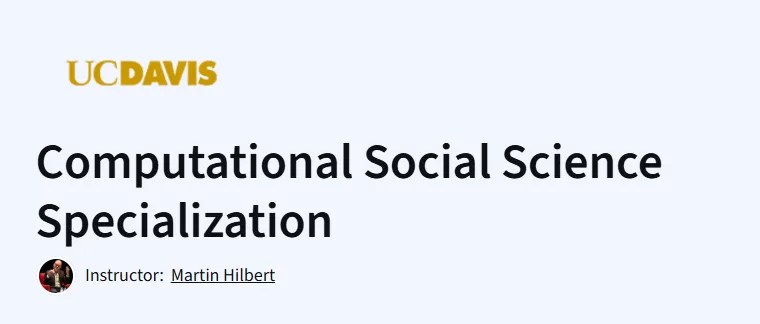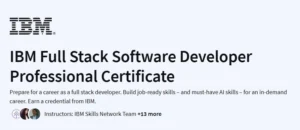What will you learn in Computational Social Science Specialization Course
Discover how social networks and human dynamics create social systems and recognizable patterns.
Define and discuss big data opportunities and limitations.
Web scrape online data, create a social network visualization with it, and use machine learning to analyze its content.
Use computer simulations to program your own artificial societies to explore business strategies and policy options.
Program Overview
Computational Social Science Methods
⏳ 11 hours
Examine the history and challenges of social science in the digital age, configure analysis databases, train simple AI models, and detect social emergence patterns.
Big Data, Artificial Intelligence, and Ethics
⏳ 9 hours
- Define big data, work with IBM Watson to analyze personalities via NLP, study AI case applications, and evaluate ethical considerations.
Social Network Analysis
⏳ 10 hours
- Learn network definitions and languages, wrangle and visualize social networks, explore generative mechanisms, and apply SNA case studies.
Computer Simulations
⏳ 12 hours
- Explore agent-based models (ABM) like Schelling’s segregation and Sugarscape, build artificial societies, and integrate hypothetical models with real data.
Computational Social Science Capstone Project
⏳ 13 hours
- Execute a full CSS workflow: scrape social media data, visualize networks, apply ML-powered NLP, and simulate generative mechanisms in an integrative lab.
Get certificate
Job Outlook
Roles: Computational Social Scientist, Data Analyst, Policy Analyst, Social Researcher.
Demand: High across academia, government, NGOs, tech firms, and think tanks for experts who can combine social theory with computational methods.
Salaries: Entry- to mid-level positions typically range from $80 000–$120 000 USD, with advanced roles commanding $130 000+ depending on sector and experience.
Specification: Computational Social Science Specialization
|
FAQs
- Basic programming familiarity is recommended, but no advanced expertise is needed.
- Python is used for scraping, visualization, and ML/NLP labs.
- Hands-on exercises guide learners step-by-step.
- Focus is on applying computational methods to social science problems.
- Ideal for beginners interested in data-driven social research.
- Includes web scraping of social media and online datasets.
- Uses IBM Watson for NLP analysis.
- Visualizes social networks and simulates generative mechanisms.
- Capstone integrates real-world data with agent-based models.
- Prepares learners for research or applied social analytics roles.
- Discusses privacy, bias, and ethical AI in social data analysis.
- Evaluates responsible use of AI and computational methods.
- Integrates ethical considerations into labs and simulations.
- Encourages critical thinking about social impact.
- Helps learners develop socially responsible research practices.
- Introduces agent-based modeling using platforms like Sugarscape and Schelling’s segregation.
- ML and NLP exercises focus on pattern detection in social networks.
- Tools are beginner-friendly with guided instructions.
- Focuses on understanding applications rather than deep algorithmic theory.
- Prepares learners for further study or research in computational social science.
- Prepares for roles like Computational Social Scientist, Data Analyst, Policy Analyst, and Social Researcher.
- Demand is high in academia, government, NGOs, and tech firms.
- Skills combine social theory with computational methods for actionable insights.
- Salaries range from $80,000–$120,000 for entry- to mid-level, $130,000+ for advanced roles.
- Builds portfolio-ready projects demonstrating applied social science analytics.





